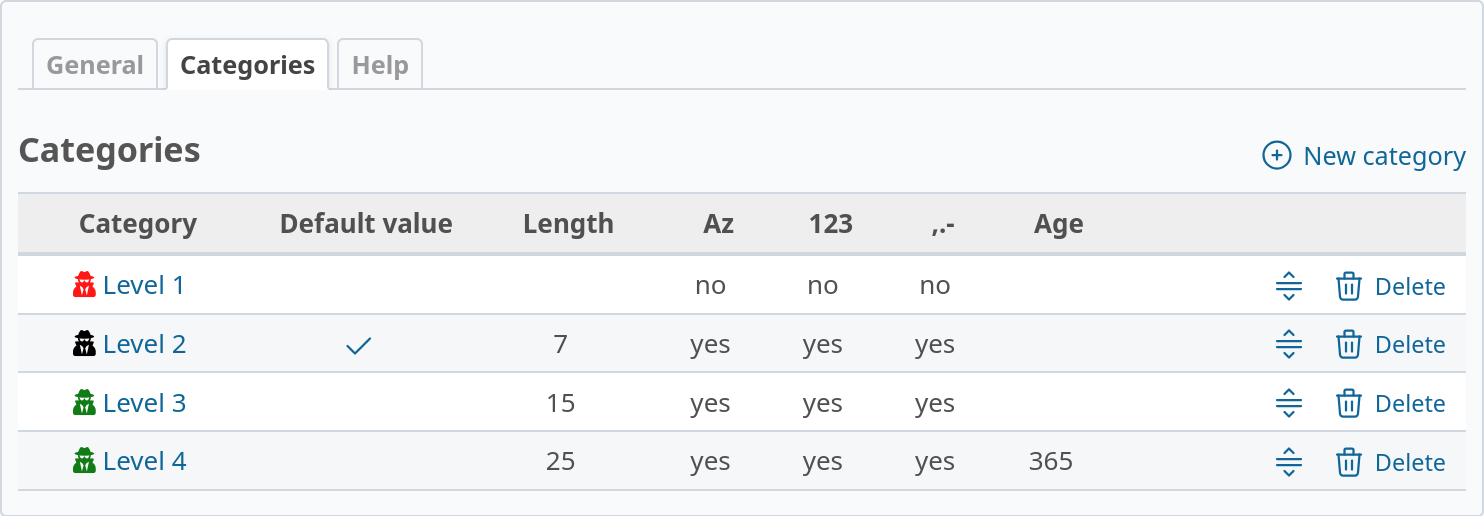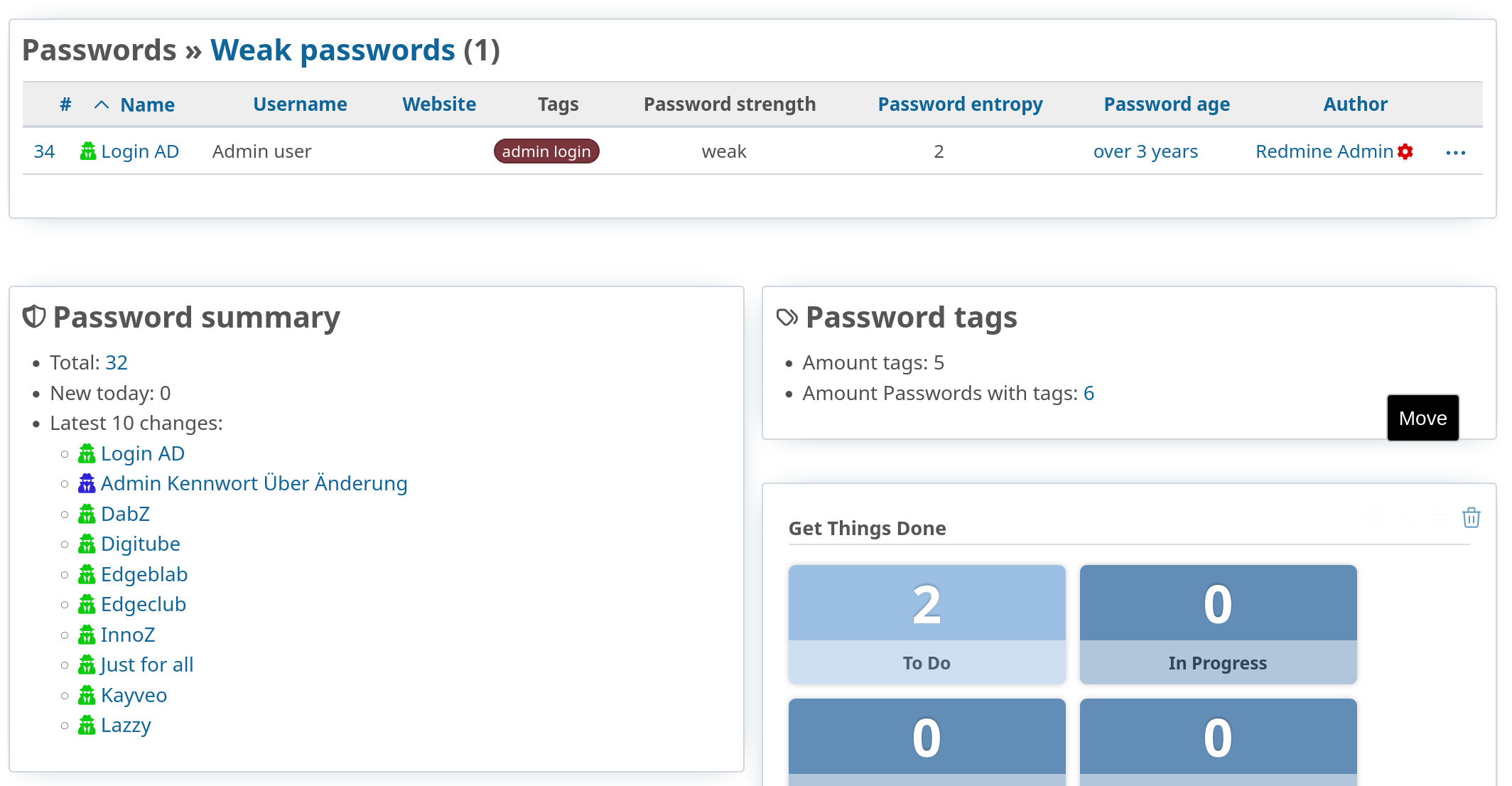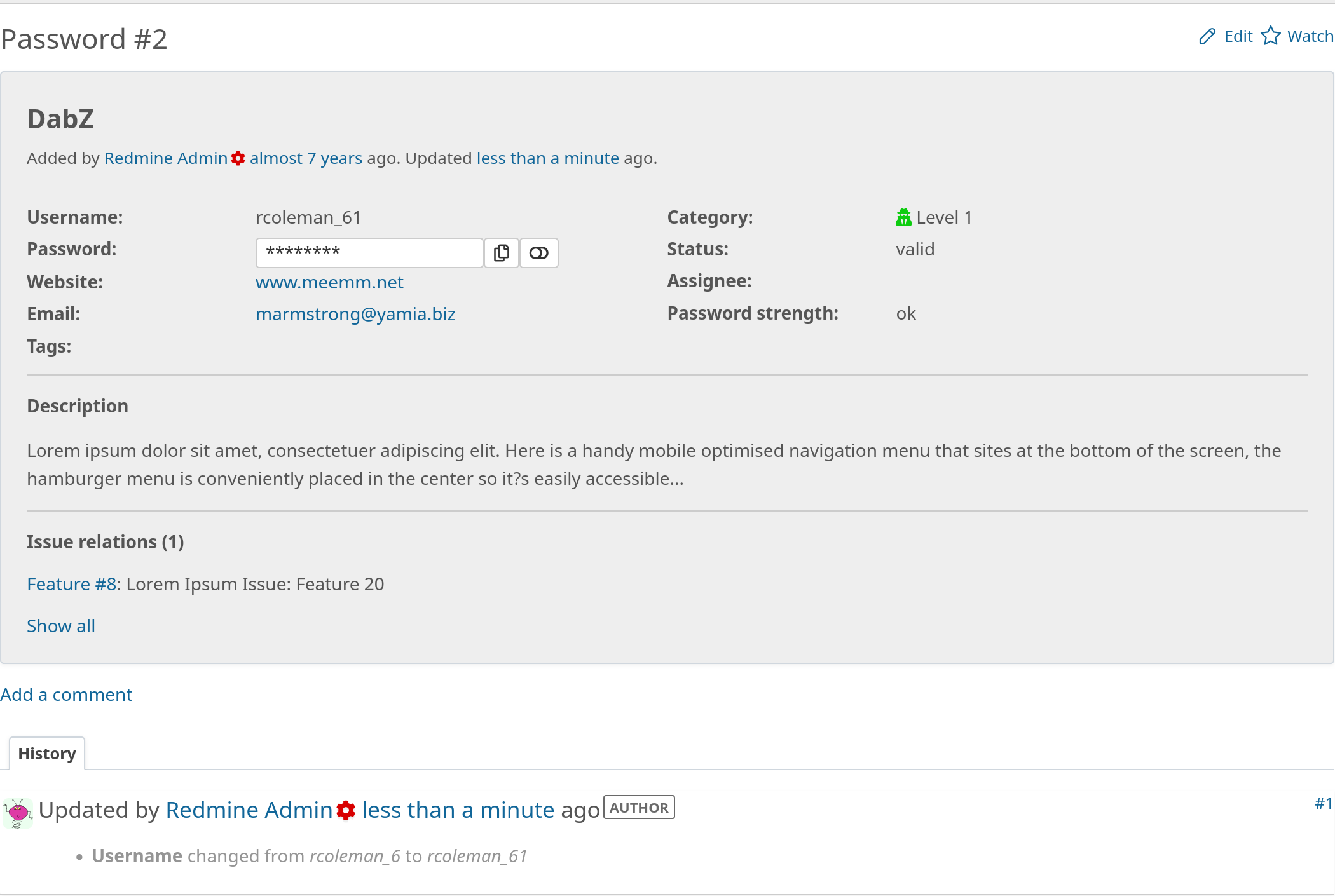It is not uncommon for project teams to pay little attention to the sensitive handling of passwords. It is quite common for important access data to be sent by email. Or Excel tables are filled with sensitive data and, as the project volume grows, get lost in the manual password chaos.
The solution: Integrated password management in Redmine with AES-256 standard encryption
The Redmine Passwords plugin is a good solution for your existing project management environment. It ensures seamless integration of password management directly into Redmine, while maintaining your usual workflows.
The Passwords plugin encrypts all sensitive data with AES-256 standard – the same encryption method that is approved for government documents with the highest level of confidentiality. Passwords and descriptions are not stored in plain text in the database.

Best practice tip: You can divide passwords into different categories—for example, according to security requirements, departments, or system types. Each category can have its own rules: minimum length, use of upper and lower case letters, special characters, or maximum password age. The integrated password generator automatically creates secure passwords according to these specifications on request.
Flexible permissions for teamwork
One advantage is the differentiated assignment of permissions. Users with administrator rights can specify who is allowed to view, edit, add, or export passwords in the Roles and Permissions section. It is even possible to share private passwords only with selected individuals. This gives you another opportunity to differentiate within a project who from the team is allowed to see your private password.

Please note: Even administrators do not have automatic access to such data. They must be explicitly assigned as project members. This security measure effectively prevents unauthorized access by privileged users who are not part of your team.
Efficient organization and search of passwords in Redmine
The Passwords plugin offers various options for quickly finding entered passwords:
- Tags: Tag your passwords for better categorization
- Live search: Search in real time for names, usernames, or URLs in the password list
- Filters and queries: Create custom lists based on status, category, or other criteria
- Security checks: Automatic lists reveal weak or outdated passwords
The predefined security lists are particularly helpful. They identify passwords that are older than 6 months, 1-3 years, or even over 3 years. This allows you to keep track of necessary updates.

Best practice tip: You can link passwords directly to issues in Redmine. Use macros to embed password lists in wiki pages or ticket descriptions. The Passwords plugin comes with dashboard support and provides its own dashboard blocks. For example, you can integrate it into the project dashboard to display the latest password entries at a glance.
Import / export possible
Existing password collections can be imported via CSV. The plugin automatically checks for completeness and errors. Various export formats are available for backups or transfer to other systems: CSV, Excel, or Atom feeds for automatic updates.
Practical application scenarios
- Development projects: Centrally manage database access, API keys, and staging environments
- Website support: Securely share FTP access, CMS accounts, and hosting data
- Customer projects: Manage temporary access and securely remove it after the project ends, as well as offer secure password transmission
- Internal IT: Organize system passwords in a structured manner and update them regularly

Best practice tip: Changes to a password entry are documented in the history: what was changed, when, and by whom. This ensures transparency within the team and supports compliance requirements.
Is password management GDPR-compliant?
The GDPR sets clear requirements for the handling of personal data – this also includes access data and passwords. The plugin can definitely help you meet these requirements:
- AES-256 encryption is state-of-the-art and meets the GDPR requirement for “appropriate technical measures.” All sensitive data is stored in encrypted form.
- Granular rights assignment ensures that only authorized persons have access to the respective passwords – a central component of the “need-to-know principle.”
- The plugin is seamlessly integrated into Redmine and therefore runs on your own infrastructure. No passwords leave your company or are stored in external cloud services. You retain full data sovereignty and are not dependent on the data protection compliance of external providers.
Conclusion
The Redmine Passwords plugin integrates password management directly into your project environment. In our opinion, this is a real game changer, because it doesn’t require any additional tools that the team has to learn, no separate logins, and the passwords are available right where you already work. This saves time, increases security, and improves collaboration. After all, what could be more practical than a direct link between passwords and an issue?
For example, if you have a server problem, you can link the root access details directly in the ticket, or in customer projects, the FTP data is immediately available. This saves everyone involved unnecessary searching and ensures clear communication.
Who the Passwords plugin is suitable for:
Perfect for:
- Medium-sized IT service providers who already rely heavily on Redmine
- Development teams with complex projects and many system accesses
- Companies with strict compliance requirements that want everything in a controlled environment
Less suitable for:
- Teams that are used to modern password managers
- Companies that only use Redmine superficially
This function is part of the Redmine Passwords plugin. An overview of all Redmine plugins from AlphaNodes is available at the Product page. Our online demo allows you to test the described functionality here.
